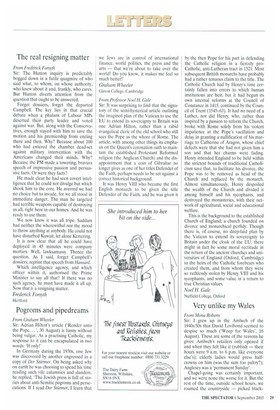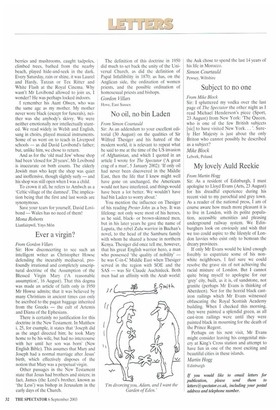Very unlike my Wales
From Mona Roberts Sir: I grew up in the Amlwch of the 1940s/50s that David Lovibond seemed to despise so much ('Weep for Wales', 16 August). These are some of the reasons he gives: Amlwch's retailers only opened if and when they felt like it (rubbish — their hours were 9 a.m. to 6 p.m. like everyone else's); elderly ladies would press halfcrowns on him (was the sum too paltry?); Anglesey was a 'permanent Sunday'.
Chapel-going was certainly important, and we were none the worse for it. But the rest of the time, outside school hours, we roamed the countryside — picked black berries and mushrooms, caught tadpoles, climbed trees, bathed from the nearby beach, played hide-and-seek in the dark. Every Saturday, rain or shine, it was Laurel and Hardy, Tarzan or Tex Ritter and White Flash at the Royal Cinema. Why wasn't Mr Lovibond allowed to join us, I wonder? He was perhaps locked indoors.
I remember his Aunt Olwen, who was the same age as my mother. My mother never wore black (except for funerals), neither was she anybody's skivvy. We were neither emotionally nor intellectually stunted. We read widely in Welsh and English, sang in choirs, played musical instruments. Some of us went on to teach in Liverpool schools — as did David Lovibond's father; but, unlike him, we chose to return.
And as for the 'old mad Jew' whose shop had been 'closed for 20 years', Mr Lovibond is inaccurate on both counts. The elderly Jewish man who kept the shop was quiet and inoffensive, though slightly surly — and his shop was still open when I was a child.
To crown it all, he refers to Amlwch as a 'Celtic village of the damned'. The implication being that the first and last words are synonymous.
Save your tears for yourself, David Lovibond — Wales has no need of them!
Mona Roberts
Llanfairpwll, Ynys Mem











































































 Previous page
Previous page